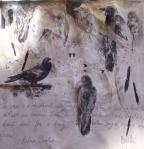A Story about the Body
The young composer, working that summer at an artist’s colony, had watched her for a week. She was Japanese, a painter, almost sixty, and he thought he was in love with her. He loved her work, and her work was like the way she moved her body, used her hands, looked at him directly when she mused and considered answers to his questions. One night, walking back from a concert, they came to her door and she turned to him and said, “I think you would like to have me. I would like that too, but I must tell you that I have had a double mastectomy,” and when he didn’t understand, “I’ve lost both my breasts.” The radiance that he had carried around in his belly and chest cavity-like music-withered quickly, and he made himself look at her when he said, “I’m sorry I don’t think I could.” He walked back to his own cabin through the pines, and in the morning he found a small blue bowl on the porch outside his door. It looked to be full of rose petals, but he found when he picked it up that the rose petals were on top; the rest of the bowl-she must have swept the corners of her studio-was full of dead bees.
Robert Hass
Friday, December 7, 2007
Subscribe to:
Post Comments (Atom)

2 comments:
I love this poem.
I read it to my students in the way Alan Sandy taught me at Sonoma State University...read it aloud twice, two different voices. I usually read it aloud first.
I first taught it to seniors, but I'm thinking about teaching it to sophomores, rising juniors.
I teach high school.
I'd love to know what poems other high school teachers teach.
I've taken a pause from cooking for my poetry potluck here in Nashville to find this poem by Haas.
I heard his partner, Joy Hirschfied--no Jane Hirschfield--read aloud once. I like her poetry also and purchased her sacred verse of women's poetry.
I'm trying to start a tradition with my faculty -- every April (National Poetry Month) host a poetry party of some kind and invite your department (half of mine can't make it but that's okay -- we have prom tonight and one colleague shared with me that poetry isn't her thing -- no worries) and other cool people on your faculty. Have food, imbibe or drink sweet tea or mineral water, read poetry after both -- read it into the night, read it out on the back porch, read it and feel it through your sluggish veins, read it as a rite of spring, as a dance, move it, fling your arms out and shake your hips and read poetry while you breathe and hope and celebrate that we are alive and well. Read poetry aloud with friends -- very important.
Thanks for the time.
The imagery created in this story helps create the mood of it. In the beginning, the way the lady is compared to her artwork helps build the fascination about her. Then when it says how he basically had to force himself to look at her helped create the sense of what came off to me as disgust he felt when she told him about her condition.
Post a Comment